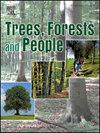Towards equitable access to land for cocoa farming: the role of customary land tenure system in Migrant and Female cocoa farmers decision to adopt good agronomic practices in Ghana
IF 2.9
Q1 FORESTRY
引用次数: 0
Abstract
Cocoa is critical to the economy of cocoa-growing developing countries. It contributes about 7 % to Ghana’s GDP and over 800,000 households depend on the sector. However, land for cocoa farming is mainly through the Customary Land tenure system (CLTS) which is contingent on one’s status as either a native or migrant. Unlike native, migrants have no land rights ownership while women access to land are inferior to men. Land tenure security influences farmers investment decision, especially in the cocoa sector where perennial crops are involved. Therefore, we assessed the implication of CLTS on Migrant and Female cocoa farmers decision to adopt good agronomic practices (GAPs) in Ghana. GAPs are essential for sustainable cocoa production and yield. A total of 178 Migrant and Female cocoa farmers and 15 key informants were purposively sampled from four communities and interviewed using semi-structured questionnaire. The results showed that sharecropping as CLTS was the primary land access method by Migrants (71.9 %) and Females (56.8 %) farmers. Insecurity in land tenure under CLTS and farmers educational status significantly (p = 0.001) affected the adoption of GAPs such as fertilizer application, weeding and planting of shade trees. Furthermore, cocoa yield in Females (320 kg/acre) and Migrants (380 kg/acre) farms were lower than Ghana’s potential yield (1.85 tonnes/acre). The findings highlight the importance of education and CLTS reforms to ensure land tenure security. The study has implication for United Nations SDGs 5 which emphasize on gender equality and SDGs 8 which protect and promote the rights and working environment of migrants.
争取公平获得可可种植土地:习惯土地保有制度在加纳移民和女性可可农民决定采用良好农艺做法中的作用
可可对种植可可的发展中国家的经济至关重要。它对加纳国内生产总值的贡献约为7%,超过80万户家庭依赖于该部门。然而,可可种植的土地主要是通过习惯土地保有制度(CLTS)获得的,这取决于一个人是本地人还是移民的身份。与本地人不同,移民没有土地所有权,而妇女获得土地的权利不如男子。土地保有权安全影响农民的投资决策,特别是在涉及多年生作物的可可部门。因此,我们评估了CLTS对加纳移民和女性可可农民决定采用良好农艺规范(gap)的影响。差距对可可的可持续生产和产量至关重要。采用半结构化问卷对来自四个社区的178名移民和女性可可农民以及15名关键线人进行了有目的的抽样调查。结果表明,农民工(71.9%)和女性农民(56.8%)的主要土地获取方式是分成制耕作。在CLTS下,土地使用权的不安全感和农民的教育状况显著(p = 0.001)影响了gap的采用,如施肥、除草和种植遮荫树。此外,雌性农场(320公斤/英亩)和移民农场(380公斤/英亩)的可可产量低于加纳的潜在产量(1.85吨/英亩)。研究结果强调了教育和CLTS改革对确保土地使用权安全的重要性。这项研究对强调性别平等的联合国可持续发展目标5和保护和促进移民权利和工作环境的联合国可持续发展目标8具有重要意义。
本文章由计算机程序翻译,如有差异,请以英文原文为准。
求助全文
约1分钟内获得全文
求助全文
来源期刊

Trees, Forests and People
Economics, Econometrics and Finance-Economics, Econometrics and Finance (miscellaneous)
CiteScore
4.30
自引率
7.40%
发文量
172
审稿时长
56 days
 求助内容:
求助内容: 应助结果提醒方式:
应助结果提醒方式:


